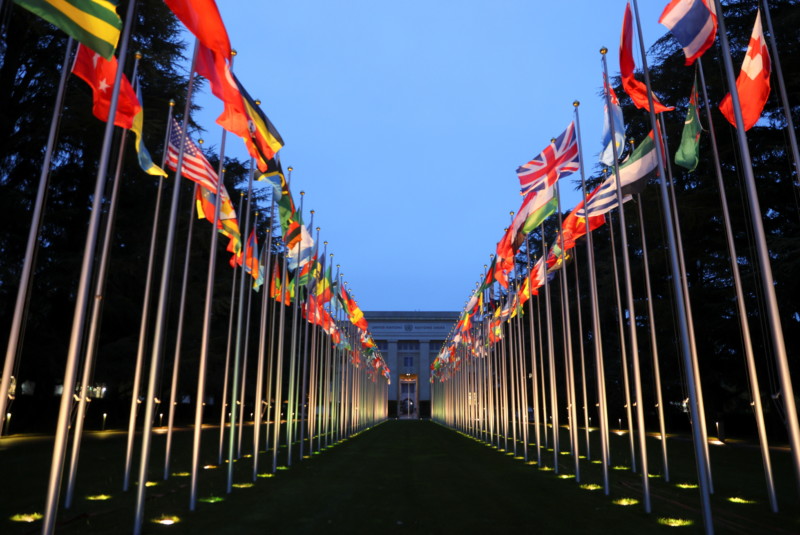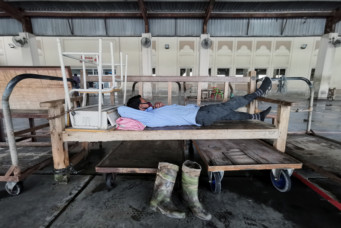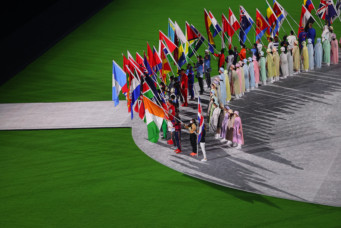Parsing the Fragmentation of International Lawyers
To make sense of the problems that plague international law, we have to understand the system that gave birth to and sustains it.

Flags flutter ahead of the launch of a joint investigation into alleged violations of international human rights, humanitarian and refugee law committed by all parties to the conflict in the Tigray region of Ethiopia, at the United Nations in Geneva, Switzerland, November 3, 2021. Denis Balibouse/Reuters
Public International Law (PIL), specifically the kind that attempts to make ethical standards for states to follow in both their domestic and foreign policies, is widely understood as difficult territory. While many laws are observed by states the world over–such as those governing maritime trade, borders, and financial agreements–many are not enforced, nor even agreed upon by the legal community. These include especially humanitarian and human rights laws.
The defense often given, when unenforceability comes up, is that at minimum PIL provides a framework for what states should do, and gives credibility to efforts that sanction or marginalize states who don’t comply with ethical international norms. Sometimes these laws make headway, particularly when they serve the interests of big power players. But often they do not. So often in fact, that AUC Law Professor Jason Beckett is building a theory of why international law, perhaps uniquely as a field, is under so little pressure to do better.
In a November webinar titled “The Fragmentation of International Lawyers,” Beckett presented the case for why international law is fraught with foundational problems it cannot seem to solve. Foremost among these is why so many claims made in the name of ethical international law have yielded so little justice in the world. “We do not live in a tolerably just world,” Beckett began. “We live in a world where 70 percent of the global population lives on less than ten dollars a day, while 15 percent of the world consumes 85 percent of its resources”.
In a global order where laws made to protect human rights seem impossible to enforce, Beckett sees a system shaping the community of people who practice PIL, a system thoroughly invested in keeping most of the world in a state of poverty and repression. Within that system, he locates an observable, ongoing fragmentation of lawyers into insular groups, where their work is increasingly siloed. What follows is a summary of his lecture, where Beckett described this state of fragmentation, before grounding it within his larger theory.
This talk was critiqued by Geoff Gordon, Senior Researcher at the T.M.C. Asser Institute Centre for International and European Law, in a discussion moderated by Nora Salem, Head of the Public International Law Department at the German University in Cairo.
The Fragmentation of International Lawyers
What does it mean to say that international lawyers are fragmented? Beckett makes several observations. First, lawyers working in the realm of PIL are divided by specialty (human rights, humanitarian, environmental, trade, etc.), methodology, and the texts and traditions they learn from in their training. They form groups along these lines, and within these groups new laws and legal opinions proliferate. “There is too much law,” Beckett says, because there is no overarching legal body in the international system to adjudicate which legal arguments are valid, or enforce those decisions. Thus, all arguments are equally valid, and for him, equally unnecessary.
Second, he argues that as a result of this “radical indeterminacy” of law, the only place that international lawyers can utilize their training, or engage in a process with internal legitimacy, is within these communities, where they regard the same texts and methods as starting points. Beckett calls these “communities of practice” and argues that given the systemic restraints, the work they engage in is basically just producing legal discourse. Its real-world impact is exceedingly limited. Lawyers in the field are pressured to accept this at the outset of their careers, and have oriented themselves toward doing “law” for an audience of their peers.
This, Beckett says, is an enormous problem, not only because these veins of international law produce so few effects, but also because they distract from the realities of global injustice, and in distracting, so contribute.
To explain how we got here, Beckett points to the history of international law, and how it evolved primarily as a tool to govern and justify colonization. At the beginning of the colonial period, around 1550, Spain created laws to manage its extraction of resources in the Americas, and relations with Indigenous groups. Other European countries followed suit, and our first framework for modern international law was born. With the end of formal colonialism in the 1950s, international law underwent a conceptual split into two forms: ethical and material (or what Beckett calls “actualized” law). Ethical law—which evolved first to justify colonial abuses—now attempts to right the wrongs of colonialism and make the world a just place for all. Material law is what is actually enforced and acted upon by states and institutions. For Beckett (and other observers), however, it merely perpetuates the colonial project under a new guise.
How Neoliberal Institutions Perpetuate the Neocolonial Project
How does material law perpetuate the Global North’s ongoing and abusive extraction of resources from the Global South (to the tune of $5.5 trillion per year)? Primarily through institutions that promote neoliberal agendas, like the World Bank and International Monetary Fund (IMF). By creating and holding developing countries to legal arrangements that make them enact neoliberal policies (cutting subsidies, for example), these institutions accomplish two things. One, they allow the continued extraction of resources from these countries. Two, they entrench conditions of immiseration in their populations, leading to poverty and unrest. When states then act to repress their society’s protests, ethical international lawyers condemn them. “We focus on how PIL fails to rescue people from harm, but not on its role in putting those people [in unsafe conditions] in the first place,” Beckett says. In this way, ethical international law clouds the debate, shifting focus away from the root causes of neocolonial injustice.
He draws on legal scholar Susan Marks’ concept of the “false contingency” to illustrate how this distraction process works. In a July article for Critical Legal Thinking, Beckett writes “A contingency is a possibility, something that may or may not happen. It remains contingent until it is either realised or precluded. A false contingency is an apparent possibility that is already precluded by systemic factors. Most claims made in the name of ethical PIL are false contingencies. They demand progressive changes that are, in a sense, possibilities—people could for example have access to food, water, shelter, and healthcare—but they cannot currently be realised. Presenting them as fundamental rights does not alter the fact that they are denied to many. It also evades the question of why people are denied access to food and water, shelter and healthcare.”
Questions and Critique
While Beckett draws on the observations of numerous scholars engaged in critiquing international law, his overall conception of how these pieces fit together into a self-perpetuating cycle is novel. When asked what he would like to see change, Beckett said that international lawyers should start by asking themselves why they’re doing what they’re doing? Why is it common practice to brush past the impotency of the laws and legal opinions they generate?
This was met with general agreement from Gordon and the audience. Gordon pressed Beckett to identify the nodes in this system he describes, where international lawyers could begin to take the fight. Other attendees asked him to look more seriously at what countries in the developing world could be doing to push back, and Beckett acknowledged that he might be missing sources of agency and change that exist in those societies.
Finally, Beckett said that international lawyers should engage deeply with the critique of neoliberalism that is gaining steam in other fields, although he doubts that the radical changes needed are likely to start or end with the legal community. “What is needed are more progressive people, willing to do the hard, granular work, getting back into institutions like the IMF and World Bank.” And the biggest constraint? Redistributing the planet’s resources to meet the needs of all people will require the West cutting back on its own consumption—way back. In this, as in international law, the first step will be getting comfortable with the hard truths.
Leslie Cohen is deputy senior editor at the Cairo Review of Global Affairs.
Read MoreSubscribe to Our Newsletter




